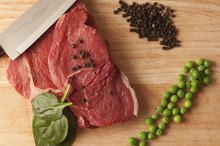Methyl Diet
Methyl is a term from organic chemistry that refers to nutrients which produce the biochemical process, methylation, where chemicals are added to proteins, DNA, or other molecules to keep your body functioning properly. Methyl-related nutrients include folate, methionine, Vitamin B12 and Vitamin B6, and have been linked to decreased risk of breast, colon and pancreatic cancer, according to the National Cancer Institute. Studies published by the American Journals of Epidimeology and the American Journal of Nutrition suggest a diet rich in these micronutrients may help you avoid cancer plus many other health problems, as well.
Homocysteine
One example of the methylation process is when your body uses the amino acid, methionine to join with your body's proteins and DNA, it produces a bi-product called homocysteine which needs to be methylated, or joined with methyl-related nutrients in order to convert it back to methionine. If methylation does not occur, homocysteine's presence increases your risk of heart disease, high cholesterol, Alzheimers, liver disease and depression. Methylation processes are happening throughout your body to keep your systems running well.
Food Sources
Nutrients That Cross the Blood-Brain Barrier
Learn More
Methyl-related nutrients are found in three groups of compounds: B Vitamins, Betaine and SAMe, S-Adenosyl-Methionine. In food sources, methyl-related nutrients can be found in foods rich in natural folate, or Vitamin B9, including strawberries, citrus fruits and leafy green vegetables. Good sources of Vitamin B12 are fish, meat, milk, and eggs. Choline oxidizes to form a source of methyl called Betaine, which is found in its highest concentration in beef liver. Toasted wheat germ and eggs are also excellent sources of choline, with cod, beef, brussel sprouts, broccoli, shrimp and salmon being good sources as well. Two large eggs contain 252 mg choline, nearly half of the recommended 550 mg per day for men.
- Methyl-related nutrients are found in three groups of compounds: B Vitamins, Betaine and SAMe, S-Adenosyl-Methionine.
- In food sources, methyl-related nutrients can be found in foods rich in natural folate, or Vitamin B9, including strawberries, citrus fruits and leafy green vegetables.
Folate
The synthetic form of folate is folic acid, found in supplements and added to fortified foods. Folate is key in producing and maintaining the cells in your body. It also makes DNA and prevents DNA from changing, which may reduce your risk of cancer, according to the National Cancer Instititute. The U.S. Food and Drug Administration issued regulations in 1996 that require the addition of folic acid to enriched grain products, making folate the most widely available methyl-related nutrient in the American diet. According to the Office of Dietary Supplements, a division of the National Institutes of Health, the daily recommended intake of folate is 400 mg.
- The synthetic form of folate is folic acid, found in supplements and added to fortified foods.
- The U.S. Food and Drug Administration issued regulations in 1996 that require the addition of folic acid to enriched grain products, making folate the most widely available methyl-related nutrient in the American diet.
Risks
How to Repair the Myelin Sheath with Food
Learn More
If your body is not doing its share of methylation, doctors can spot your problem through increased homocysteine, the amino acid by-product. One of the main problems from high levels of homocysteine is coronary artery disease. Outside of diet, you are at higher risk of increased homocysteine if you do not exercise at least three times per week; if you have a family history of heart disease, neurological disease, liver problems or depression, if you smoke or use birth control you are also at increased risk.
Prevention
Diet plays a key role in your risk of increased homocysteine. Processed foods and fast foods contain only a fraction of the necessary methyl-related nutrients your body needs for methylation. Drinking even moderate amounts of alcohol may prevent your body from properly absorbing methyl-related nutrients, according to a study published by the Journal of Nutrition. Another university study by Oregon State notes that high doses of methyl-related supplementation has been linked to excessive production and excretion of trimethylamine which causes vomiting, salivation, increased sweating and a fishy-smelling body odor. Discuss your specific dietary needs with your doctor before making any changes.
- Diet plays a key role in your risk of increased homocysteine.
- Drinking even moderate amounts of alcohol may prevent your body from properly absorbing methyl-related nutrients, according to a study published by the Journal of Nutrition.
Related Articles
References
- The Journal of Nutrition; "Folate, Methyl-Related Nutrients, Alcohol, and the MTHFR 677C→T Polymorphism Affect Cancer Risk: Intake Recommendations"; Lynn B. Bailey; November 2003
- The American Journal of Clinical Nutrition; "Risk of Colorectal Cancer"; Catarina Sousa Guerreiro, et al; November 2008
- American Journal of Epidemiology; "Dietary and Other Methyl-Group Availability Factors and Pancreatic Cancer Risk in a Cohort of Male Smokers"; Rachael Z. Stolzenberg-Solomon, et al; August 2000
- Oregon State University: Micronutrient Information Center
- Office of Dietary Supplements: Dietary Supplement Fact Sheet: Folate
Resources
Writer Bio
Writing since 1978, Allison Stevens was writer and publisher of the Calvary Christian Fellowship newsletter and has had work appear in various online publications. Stevens has certification to teach group fitness and is a licensed Zumba instructor, teaching fitness classes for adults and children daily. She enjoys researching various subjects including health, and holds an Associate of Arts.









